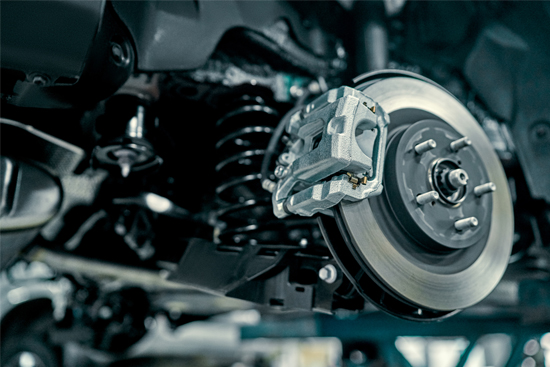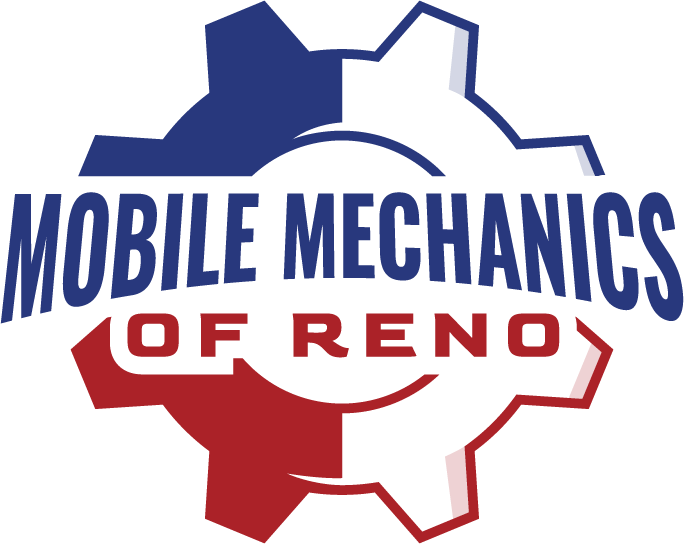What is a Brake System?
A brake system aims to decrease speed or stop a moving object. Various components inside the braking system must transform moving energy into heat to accomplish this. Friction makes this possible.
How Do Car Brakes Function?

Brakes are one of the most important aspects of any vehicle, and it is impossible to travel without brakes. It is also essential to keep in mind that your brakes should not be too weak nor too firm. At Mobile Mechanic Reno, we offer top-notch brake repair and maintenance services! We also offer reliable car inspection services!
Rough-texture brake pads or brake shoes are pressed against the revolving areas of the body, either disc or drum when the brakes on a running car are enabled. The kinetic energy or momentum is then converted into heat energy by the rubbing surfaces’ kinetic friction, which allows the vehicle to slow down or stop.
When a car comes to a halt, static friction holds it in place. Every movement is resisted by the friction of brake surfaces as well as the friction between tires and roads. Brakes are released to counteract the rigid inertia that keeps the vehicle from moving. The transmission and drivetrain translate the thermal energy of the engine’s combustion into kinetic energy, and the vehicle moves.
Types of Brakes
Most vehicles have disc brakes and drum brakes. Drum brakes are standard in most vehicles. In addition to that, cars do have anti-lock brakes and also emergency brakes.
A disk brake consists of a cast-iron disc with a bolt attached to the wheel hub and a caliper. The rotor, brake pads, pistons, and caliper make up a disc brake mechanism in a car. The pistons drive the brake pads into the rotor to slow or stop the engine.
In a drum brake, the wheel is attached to a hollow drum. When you press the brake pedal, the hydraulic pressure pushes the wheel valves against the drum. Because of the tension produced, the car slows or stalls.
When driving on slick or snowy surfaces, anti-lock brakes come in handy. This type of brake system is more common in newer vehicles. Anti-locking brakes prevent the wheels from “locking up,” and prevent the tires from skidding on slick or wet roads.
Emergency brakes are essential when your main brakes are not working. On the other hand, it also prevents your vehicle from moving while parked.
A handbrake is a typical example of an emergency brake. Its primary function is as a parking brake. You can also use it when the hydraulic mechanism fails. The handbrake on the two rear wheels is electric.
Typical Brake Problems
Braking devices have many components that wear out and need to be replaced every few years. It’s no wonder that brake problems are among the most common concerns that most car owners face.
Call a mobile mechanic right away if you find a change in the efficiency of your car brakes. Brake issues, like any other car problem, should be taken seriously. One of the car’s most critical protection features is the brakes.
You should not until you find a flaw on your brakes before you have it checked or get a regular automobile check-up. Brake machine components have a finite lifetime. Your trusted car technician would need to inspect, fix, or replace them. Here’s a list of things to look out for when it comes to brake problems:
This is one of the first and most obvious indicators that the vehicle needs a brake check. When one of your dashboard’s red or yellow brake signs is turned on, it might mean you’re due for a car inspection or car repair. It may even be an alert from your vehicle that something is wrong with your car.
A strong chemical odor after stepping on your brakes could be a sign of brakes overheating. It can also be a problem with the clutch. If the smell is coming from the wheels, it indicates that the vehicle is not safe to drive or use.
When your vehicle bounces or rocks while you drive, it may be a sign of broken shock absorbers. This means an auto mechanic should replace it.
Car pulling to one side can be due to a faulty brake hose or a caliper problem. During braking, one brake caliper can apply more or more of the pressure, resulting in unbalanced stopping.
Get a repair inspector to look for fluid leakage from the master cylinder or otherwise in the braking system if you have a soft brake pedal. The master cylinder helps regulate your brakes. Also, the brake fluid is contained in its tank. When the brake fluid begins to spill, the brake pads will not have enough strength to function properly.
Shaking in the steering wheel or vibration when you apply the brakes may be the result of an uneven rotor. An uneven rotor can cause the steering wheel to feel shaky or vibrate.
The most common cause of a soft brake pedal is that there is still air in the machine.
A grinding sensation in the pedal may indicate a variety of things. A piece of gravel or there may be rocks lodged in the caliper assembly, which can be removed fast.
However, you could have gone too long without having your brakes serviced. The brake pads may be wearing out, and you’re hearing metal-on-metal noise, and it could be a sign that your brakes are not in good condition.
Brake components deteriorate with time. Self-diagnosing symptoms or putting off brake maintenance could put you and your passengers in danger. And as with many other automobile problems, the longer you wait to address a problem, the more likely you are to incur significant maintenance costs. So don’t self-diagnose, call our experts at Mobile Car Repair Reno.

